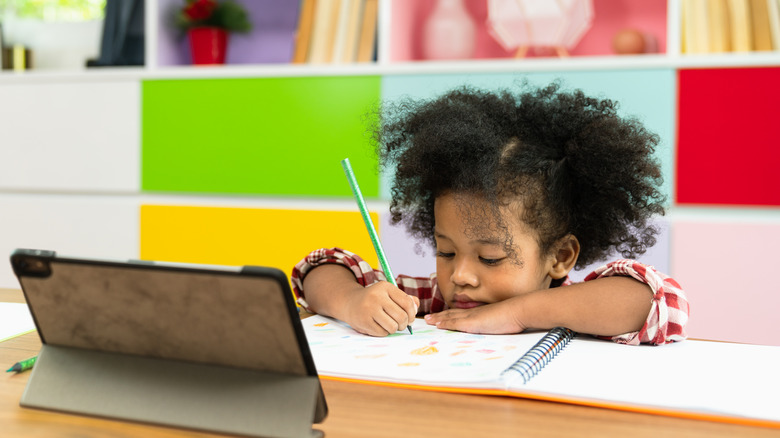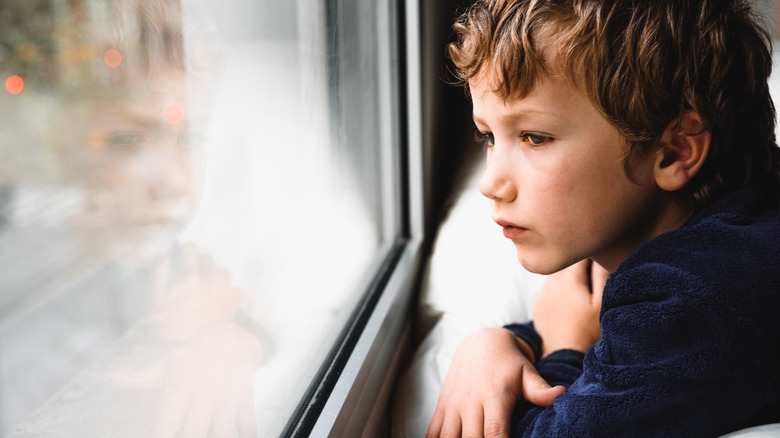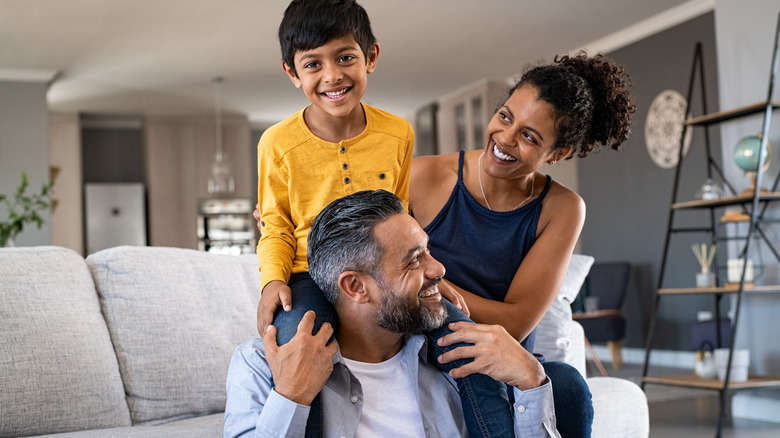A Pediatrician Explains How COVID-19 Has Impacted Child Development
During the height of the pandemic, young children abruptly transitioned from in-person learning to online schooling as families quarantined across the country. In an interview with Health Digest, Dr. Susan Walker, pediatrician at Stony Brook Children's Hospital, explains how this unprecedented shift has affected both children and teens alike, even with the worst of the pandemic seemingly behind us.
"Children thrive on social interaction," Dr. Walker states. "When the pandemic began and isolation became our new reality, we all experienced a loss of social connection. Our children were especially impacted because they learn so much from interacting with others." Specifically, she explains that many children lost the opportunity to learn through play. "Reciprocal play (sharing toys with others in a give-and-take fashion) helps kids develop new skills, both developmentally and socially," she says. "When children play together, shy kids become less fearful and outgoing kids learn the best way to approach others and make friends."
The effects of social isolation
Dr. Walker goes on to tell Health Digest how this lack of socialization is likely to affect children in the long run. "Social isolation was especially difficult for our youngest kids, who spent their first years of life rarely seeing adults or children other than those in their immediate family," she states. "The result is that many of them became excessively stranger-anxious and timid around others. It's going to take a while for them to recover from that loss of social interaction."
Dr. Walker also points out how this lack of social interaction has impacted children previously diagnosed with developmental delays. "The situation was also problematic for those children with already diagnosed developmental delays who were receiving services such as physical therapy, occupational therapy and speech therapy," she states, highlighting how many of these services also began operating remotely. "I admire the therapists' ingenuity in adapting their services to the online platform," Dr. Walker says. "Still, it's hard to imagine remote physical therapy, for example, being as robust an experience as in-person, hands-on therapy."
COVID's impact on education and adolescents
In addition to a loss of learning through socialization, Dr. Walker explains that students' academic learning was also compromised throughout the pandemic. "The transition to online learning for school-age kids certainly had an impact on their education," she says. "Studies have documented a pandemic-associated loss of one third of an academic year's worth of learning."
Dr. Walker goes on to acknowledge the profound effort that educators made during such extraordinarily challenging circumstances. "This finding isn't surprising. No matter how hard the teachers worked, and they worked really, really hard, kindergarten online just isn't the same as kindergarten in person."
However, it wasn't just children who experienced the social, educational, and developmental impacts of the pandemic. Teenagers also greatly felt the effects of quarantine too. "The developmental task of adolescence is separation from the nuclear family and establishing adult-type relationships with peers," Dr. Walker explains. "The pandemic abruptly took our teens' social network away, reducing contact with friends to texting, facetime, and other online platforms which we know aren't as good for mental health as in-person interaction," she states. "The result has been an incredible increase in anxiety and depression among our teens."
How caregivers can support the development of children and teens
To help alleviate both the short-term and long-term impacts of COVID-19 on children and adolescents, Dr. Walker offers advice to caregivers. "First and most important, spend quality time with your children," she says. "Read to them, play games with them, get down on the floor and crawl around with them." Dr. Walker also encourages socialization outside of the home. "If you are able, join a play group or enroll your young child in a preschool. Even a few hours per week will help your child to socialize and learn new skills."
Dr. Walker also suggests reaching out for help when needed. "If you have any concerns about your child's development, ask your pediatrician right away; there's no need to wait until your next scheduled visit," she says. "We are experts in early childhood development and can help you assess any concerning issues and access the services your child needs to thrive developmentally."
However, doctors aren't the only resource available to caregivers. "For your school-aged kids, touch base with their teachers and see if there is anything you can do to supplement their [learning] at home," she states. "Finally, check in with your adolescents regularly and ask them how they are managing," she says, concluding the interview. "If you have any concerns about your teen being depressed or anxious, reach out to your pediatrician immediately. We have resources to provide help to those struggling with mental health issues."




